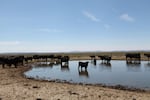Editor’s note: Election Day is Tuesday, Nov. 5. Stay informed with OPB on the presidential race, key congressional battles and other local contests and ballot measures in Oregon and Southwest Washington at opb.org/elections.

An undated image provided by the campaign for U.S. Rep. Cliff Bentz, who is seeking reelection for the U.S. House Oregon District 2 seat, on Nov. 5, 2024.
Courtesy of candidate
Even by Eastern Oregon standards, U.S. Rep. Cliff Bentz grew up in a remote part of the state.
He was born in Salem but spent most of his childhood years in Harney County, first at the venerable Whitehorse Ranch near the Nevada border before his family bought some property and started a cattle ranch 150 miles north near Drewsey. He was the second of seven children in a large, Catholic family.
“Every day, when you’re on the ranch, is spent working,” the Republican congressman said in September from his office in Washington D.C. “Except for Sunday, when we went to church.”
When they lived on the Whitehorse, going to church meant driving four hours to Jordan Valley in southern Malheur County.
Life on the ranch taught a young Bentz the value of water in the high desert and the capitalism that drives agriculture — two fundamental forces that shape his political viewpoint.
“It was an interesting way to grow up,” he said. “Learned a lot about how the cattle business works. Learned a lot about the exposure to real markets and how you get to suffer the ups and downs of markets.”
Without access to a television or telephone, Bentz turned to books. Through reading, he built the kind of ambition that would take him out of Harney County.
“When I was about 14, I was reading something that made me suddenly realize that the true source of power in the United States was here, in Congress,” he said. “In the back of my mind, I had hoped that someday I would get here.”
Bentz spent the next 50 years building the kind of resume that could take him there. He also recently hit another milestone: For the first time in his political career, Bentz is a part of the majority.
Related: What you need to know about voting in Oregon and Southwest Washington
Across 12 years in Oregon’s House of Representatives and Senate, Republicans never held a majority in Salem. For the Ontario attorney, that meant compromising with Democrats when he wasn’t trying to outright prevent their policy agendas. Bentz has carefully planned and executed a political career focused on using law and policy to benefit farmers and the natural resource industry, according to those who know him well, even as it puts him at odds with conservationists.
Even as the GOP controls the U.S. House and Bentz’s reelection to a third term is all but guaranteed this November, he now finds himself in a familiar position. At 72 years old, Bentz has focused on using his next term to secure part of his Congressional legacy by shaping — or stopping — an Owyhee monument proposal. To achieve that goal, he may need to harken back to his days in Salem by working with Democrats.

Cattle grazing in Harney County, Oregon on July 19, 2018.
Conrad Wilson / OPB
From Drewsey to Salem
Bentz hopscotched around the state as he went through high school, college and law school. When it was time to consider where he would start his career, he specifically chose the law firm Yturri Rose in Ontario because it was the “political hub” of Eastern Oregon. The firm had been cofounded by former Republican state Sen. Tony Yturri, who served 16 years in the Legislature and another 18 on the Oregon Transportation Commission. When prominent politicians were making swings through Eastern Oregon, they’d stop to see Yturri.
While Bentz wanted to follow in his mentor’s footsteps after joining the firm in 1977, he bided his time as he built a local profile and the kind of personal resources that would allow him to pursue a legislative career seven hours away in Salem.
In the meantime, Bentz built a life for himself in Ontario. He married veterinarian Lindsay Norman in 1987 and they adopted two children, Scott and Allison. Having played guitar throughout college and law school, Bentz participated in the folk mass group at Blessed Sacrament Catholic Church for more than 20 years.
Tim Helfrich met Bentz after he moved from Eugene to work at Yturri Rose in 1981, and the men bonded over playing guitar and their shared faith. He remembered Bentz as a determined attorney.
Related: Issues important to Oregon voters
“He’s almost obsessive about understanding and mastering whatever problem is facing him, and sometimes would drive his fellows in the law firm crazy,” he said. “He needed to know everything about whatever case or problem he was working on.”
Bentz specialized in water law and worked at the behest of farmers and ranchers to protect their water rights, culminating with an appointment to the Oregon Water Resources Commission, a position he would hold for eight years. He entered local politics in 2005 after beating an incumbent on the Ontario School Board.
By the time Oregon District 60 state Rep. Tom Butler announced he was resigning in 2007 to go on a mission for the Mormon church, Bentz was well prepared to replace him. Farmers and ranchers lined up to endorse him.
The county commissioners appointing Butler’s replacement picked Bentz over two other opponents. In a letter to the Argus Observer explaining why commissioners chose Bentz over a more local candidate, a Harney County judge said the ratio of people who contacted commissioners about the appointment was 4-1 in favor of Bentz.
Through his years in the state House and then Senate, Bentz never faced another serious political challenge at the ballot.

Sen. Cliff Bentz, R-Ontario, asks questions during the Senate Judiciary Committee work session for House Bill 2625 on April 30, 2019.
Kaylee Domzalski / OPB
‘A new breed of lawmaker’
In its House District 60 endorsement, the editorial board praised Bentz for representing something new.
“The old political paradigm in Eastern Oregon has changed,” the board wrote. “Bentz represents a new breed of lawmaker, one that can put aside dogma and focus on the task at hand while creating coalitions with politicians on the other side of the aisle.”
It’s a reputation Bentz mostly upheld during his time in Salem, and one that grew more important as Democrats’ majority grew.
“Twelve years in Salem and not one day on the majority, so you better learn how to reach across the aisle, because that’s about all you got,” Bentz told OPB.
He worked with Democrats to pass transportation packages and co-sponsored a bill with then-Speaker Tina Kotek to establish a state economic development board that focused on how to keep Malheur County communities competitive with Idaho.
Still, an act of defiance rather than collaboration would become one of the defining moments of Bentz’s legislative career.
Heading into the 2019 legislative session, Bentz knew Democrats were interested in advancing cap-and-trade legislation, a system where the state would “cap” greenhouse gas emissions while allowing businesses to “trade” credits to stay beneath the cap.
Bentz was named vice chair of the Joint Committee on Carbon Reduction and headlined an electric cooperative conference panel with state Sen. Michael Dembrow, the Democratic co-chair of the carbon committee, to find a compromise on the cap and trade issue.
“Cliff and I definitely didn’t agree on all aspects of the policy, but I think they were impressed with the way we were able to speak candidly and collegially with one another,” Dembrow said.
But once legislators began drafting and debating actual legislation, things began to break down. In Bentz’s recollection, Democrats froze him out of discussions and backed out of promises. Dembrow said cap and trade supporters worked hard to direct the benefits of the program toward the rural part of the state, but the Republican caucus saw capping emissions as a bridge too far.
Bentz, too, considered the Democrats’ bill “fatal” to his district, so he joined his fellow Republicans in walking out of the legislative session to deny a quorum of lawmakers who could pass the bill. They wouldn’t return until the final days of the session, after Democrats withdrew the cap and trade bill.
Five years later, Dembrow said he believes Bentz negotiated in good faith and wasn’t instigating the walkouts. Instead, Dembrow blamed “extreme elements” who wanted to kill the bill from the start, pulling Bentz with them.
Related: Listen to 'OPB Politics Now'
“Movements like that take on a life of their own, unfortunately,” he said. “Ultimately, legislators were under a lot of pressure to do the walkout. It’s a real shame, because once the walkout is a potential tool, it becomes really difficult not to use it.”
Bentz left the state Senate in 2019 to eventually replace longtime U.S. Rep. Greg Walden in the 2nd Congressional District. His former colleagues walked out again the next year, and Bentz offered support.
“Republicans stood up, just as I did eight months ago, and walked out, for CD2 and all rural districts and everyone else who believes that a capitalistic economic system is better than what the Democrats want: a socialistic ‘command and control’ system,” Bentz wrote on his campaign website at the time.
The long-term benefits of walking out were mixed. In 2021, then-Gov. Kate Brown issued an executive order that would lead to the Climate Protection Program with the express goal of regulating carbon emissions. That effort underwent legal challenges but is still moving forward. In 2022, Oregon voters curtailed legislative walkouts by passing Measure 113, which prohibits lawmakers from seeking re-election if they hit a certain number of unexcused absences.
Bentz still thinks capping carbon emissions is a bad policy. In his estimation, Oregonians are the victims of “wishful thinking” from Democrats who believe there is a “magic” solution to stop fossil fuel consumption.
“There’s nothing magic about it,” he said. “What works is if you can prompt a solution that works financially for people, then people will knock you down trying to get to it.”

Residents and conservationists disagree over what should be done to protect the Owyhee region in southeastern Oregon.
Amanda Peacher / OPB
Canyon politics
These days, one of Bentz’s priorities is the Owyhee Canyonlands, which he characterizes as nothing special.
As a part of the campaign to get the area declared a national monument, the Protect the Owyhee Canyonlands coalition cycles through a color palette to paint a picture on its website: the land is defined by its “vermillion hues,” “chocolatey browns” and “olive greens.”
Bentz’s version is a lot more mundane.
“This is a huge, for the most part, flat expanse,” he said. “There is a deep canyon running through it that’s quite long. And that’s what would be inside this so-called monument.”
It’s the type of description that Tim Davis finds perplexing. Davis founded Friends of the Owyhee in Ontario in part because of how special the land was to him.
“I found that a lot of locals, all they’ve ever done is gone up to the Owyhee Reservoir or driven down Highway 95 to get to Winnemucca, Nevada,” he said. “They really haven’t been in the Owyhee.”
Bentz called monument supporters “urban activists funded by sportswear companies” as he was introducing an amendment to an appropriations bill in 2023 that would prohibit federal spending on a national monument in Malheur County. He has spoken out against an Owyhee monument throughout his political career, arguing that it would affect cattle grazing and ore mining in the area while inundating the land with tourists from the rapidly growing Boise metro area.
“Do you think that’s going to be good for the land?” he said. “Do you think having a million people next door is going to improve things for the plants and animals and other folks that live in that space? The answer is, it won’t.”

Leslie Gulch in Southeastern Oregon is part of the Owyhee canyonlands.
Amanda Peacher / OPB
Public sentiment in the area has historically been on his side. A 2016 Malheur County special election asked voters if they would support an Owyhee national monument. In an election with nothing else on the ballot, 90% voted no.
Davis said Friends of the Owyhee and their allies have worked to change public opinion since then. The Protect Owyhee coalition has collected supportive testimonials not just from conservation groups but also local leaders like the CEO of the Ontario Chamber of Commerce and the mayor of Vale. Kotek, who is now Oregon’s governor, sent a letter in August affirming her support for an Owyhee monument.
Coalition members are also supporting a route that could head off a monument entirely.
In 2019, U.S. Sen Ron Wyden convened a working group of conservationists, ranchers and other local interests to hammer out a deal. The group’s recommendations became the basis of Wyden’s 2023 bill, the Malheur Community Empowerment for the Owyhee Act, or the Malheur CEO Act.
Instead of an up to 2.5 million acre monument that was proposed during the Obama administration, the legislation would designate a more definitive 1.1 million acres as federally protected wilderness. Its supporters highlight that the bill would protect the canyonlands’ ecological value, allow ranchers to continue cattle grazing, and move land important to the nearby Burns Paiute Tribe into federal trust.
But the coalition isn’t backing off from its monument push entirely. With the bill’s future uncertain, the coalition has asked President Biden to declare Owyhee a monument on his way out of office, a move some presidents have favored in the past.
Bentz initially wanted nothing to do with the Malheur CEO Act. But nearly a year after slamming the bill in the Malheur Enterprise and with Biden’s term in office winding down, the Republican is negotiating with Wyden.
The first thing Bentz wants to ditch is the bill’s name, preferring a rebrand as the Oregon Owyhee Wilderness and Community Protection Act. His proposed changes go beyond the superficial, too. He wants Wyden to drop 200,000 acres of land with “wilderness characteristics” and to add more clarity on maintaining motorized access for tribal members, government workers and ranchers.
Bentz is trying to thread a needle he’s familiar with from his days in the Oregon Legislature: allowing a Democratic bill to move forward while securing enough concessions to make it palatable in his district.
“I hope that whoever’s in charge of the administration recognizes the damage that simply stating that, ‘We’re going to have a monument here’ would do,” he said. “I hope they get it, because the approach that we’ve laboriously put together — and I spent a big chunk of the last year working to get into a form that’s going to be acceptable to all the people I represent, grudgingly, in some cases — will work.”
Congressional legacy
As rioters stormed the Capitol to prevent Joe Biden from becoming president in 2021, the newly elected Bentz once again tried to choose a middle path.

An undated image provided by the campaign for U.S. Rep. Cliff Bentz, who is seeking reelection for the U.S. House Oregon District 2 seat, on Nov. 5, 2024.
Courtesy of Cliff Bentz
Prior to the insurrection, Bentz asked his staffers to investigate if any of the states’ elections violated the Constitution. They came back with Pennsylvania and he voted against that state’s certified results. Bentz described it as an apolitical process, even as election denialism pushed by former President Donald Trump deepened partisanship. Bentz plans to follow the same course in 2025.
“It won’t be how either candidate reacts to the election that determines what I do,” he said. “Just like four years ago, it will be whether or not I believe that the U.S. Constitution was followed that determines what I do.”
Bentz’s approach didn’t affect his standing with former President Donald Trump, who endorsed him in May.
Bentz will turn 73 in January, and his already conservative district was made even more so during redistricting in 2022. While his boyhood goal had once involved making it all the way to the U.S. Senate, Bentz said he knows that’s unlikely at this point.
He said Washington, D.C., is “night and day” compared to Salem. The sheer number of congressional members means it’s harder to build relationships. “Everything here is driven one way or another, by pure politics,” he said.
He’s still trying to cultivate a bipartisan reputation, telling The Bulletin in Bend that he broke out his guitar again to play in a congressional prayer group, where he’s met and befriended several Democrats.
Bentz described his long term goal in Congress as simple, and something he’s done his entire political career.
“My personal goal has been, since the day I got here, to make the best deal I can when bad things come up for my part of the state,” he said.